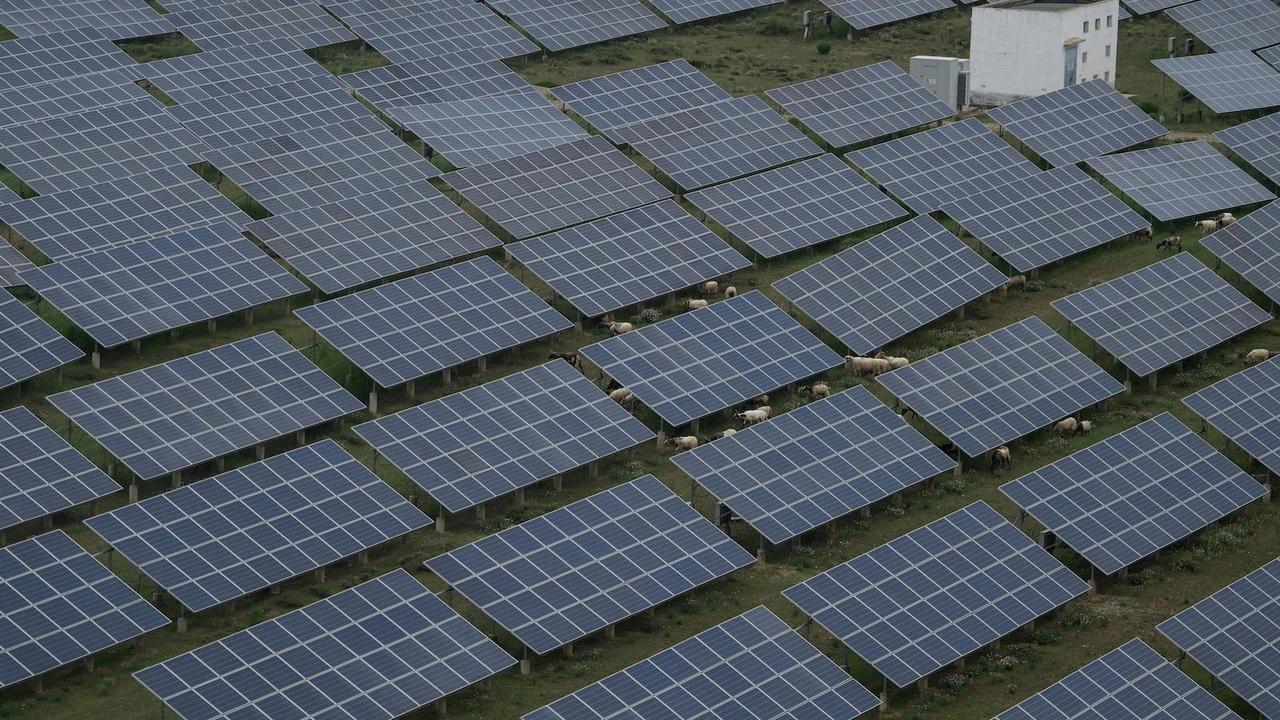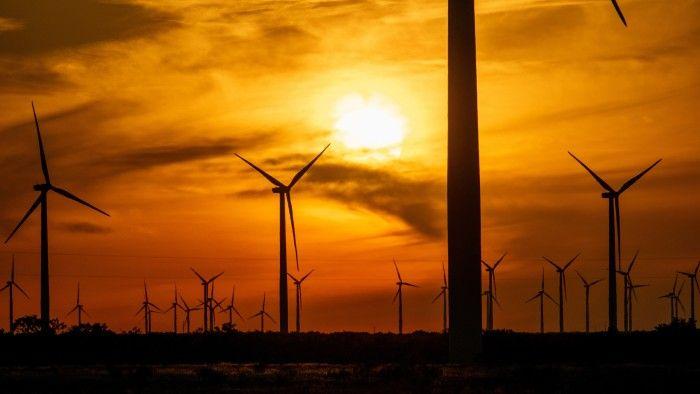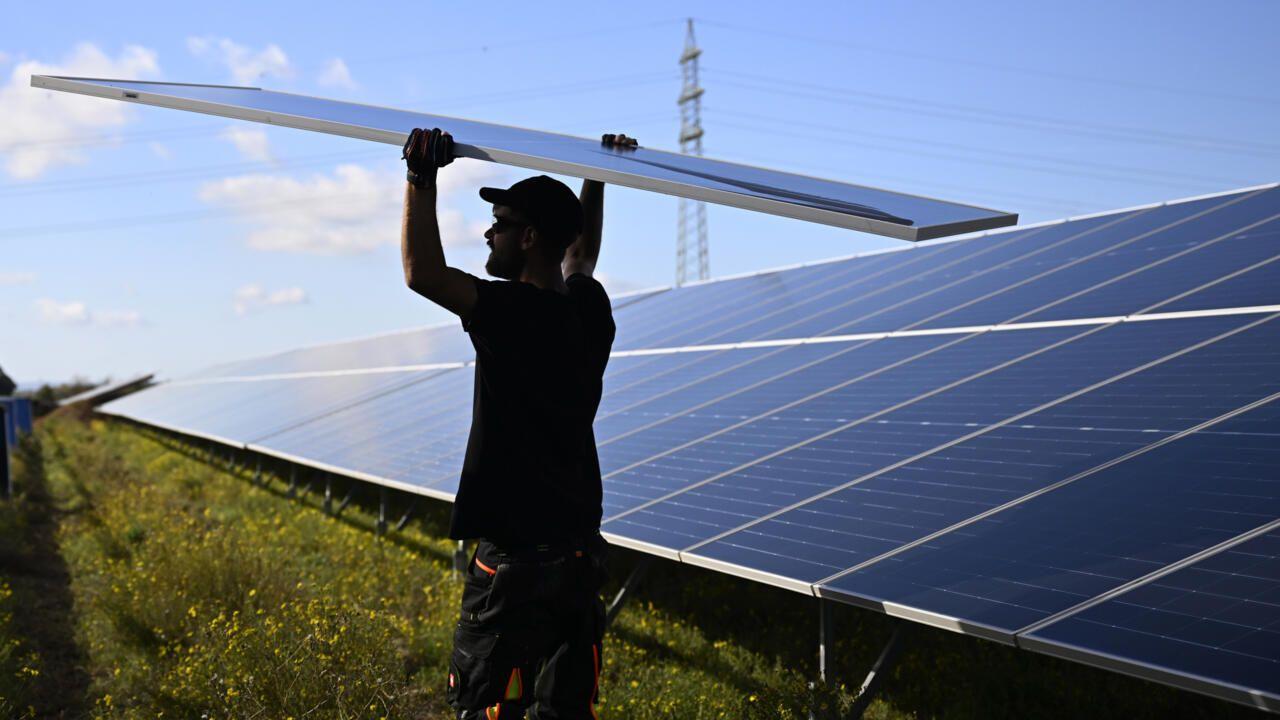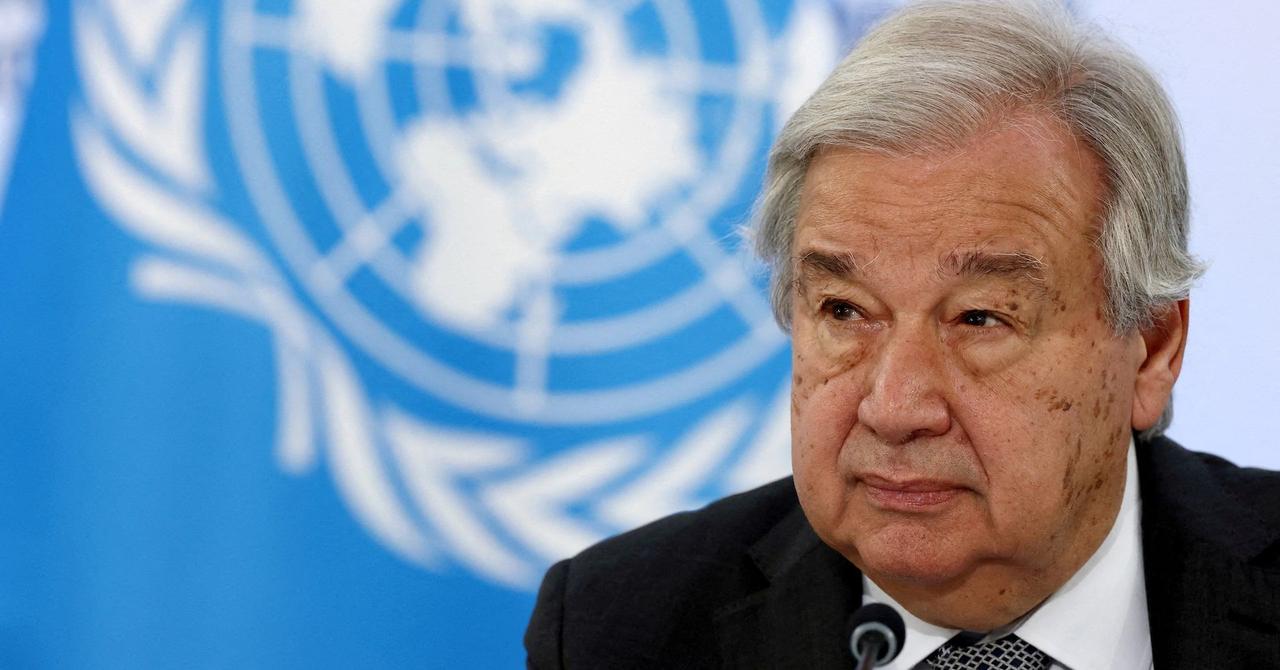UN Reports: Renewable Energy Reaches Global Tipping Point, Outcompeting Fossil Fuels
5 Sources
5 Sources
[1]
UN says booming solar, wind and other green energy hits global tipping point for ever lower costs
NEW YORK (AP) -- The global switch to renewable energy has passed a "positive tipping point" where solar and wind power will become even cheaper and more widespread, according to two United Nations reports released Tuesday, describing a bright spot amid otherwise gloomy progress to curb climate change. Last year, 74% of the growth in electricity generated worldwide was from wind, solar and other green sources, according to the U.N.'s multiagency report, called Seizing the Moment of Opportunity. It found that 92.5% of all new electricity capacity added to the grid worldwide in that time period came from renewables. Meanwhile, sales of electric vehicles are up from 500,000 in 2015 to more than 17 million in 2024. The three cheapest electricity sources globally last year were onshore wind, solar panels and new hydropower, according to an energy cost report by the International Renewable Energy Agency (IRENA). Solar power now is 41% cheaper and wind power is 53% cheaper globally than the lowest-cost fossil fuel, the reports said. Fossil fuels, which are the chief cause of climate change, include coal, oil and natural gas. "The fossil fuel age is flailing and failing," United Nations Secretary-General Antonio Guterres said in Tuesday morning speech unveiling the reports. "We are in the dawn of a new energy era. An era where cheap, clean, abundant energy powers a world rich in economic opportunity." "Just follow the money," Guterres said, quoting the reports that showed last year there was $2 trillion in investment in green energy, which is about $800 billion more than in fossil fuels. UN officials say switch to renewables needs to speed up Still, United Nations officials said the switch to renewable energy, while remarkable compared to 10 years ago, is not happening fast enough. The global renewables growth has been mostly in developed countries such as China -- where one-tenth of the economy is tied up in green energy -- as well as countries such as India and Brazil. Yet Africa represented less than 2% of the new green energy capacity installed last year despite having great electrification needs, the reports said. United Nations officials blamed the high cost of capital for the Global South. "The Global South must be empowered to generate its own electricity without adding to already unsustainable level of debts," said Bahamian climate scientist Adelle Thomas of the Natural Resources Defense Council. Thomas, who did not work on the reports, added that they debunk the myth that clean energy cannot compete with fossil fuels, instead showing a clean energy future is not just possible but likely inevitable. The U.N. reports are "right on the money," said University of Michigan environment dean Jonathan Overpeck, who also wasn't part of the studies. He said the economic tipping point leads to a cycle that keeps driving renewable costs down and makes fossil fuel power less and less desirable. Renewables grow despite high subsidies for fossil fuels And renewables are booming despite fossil fuels getting nearly nine times the government consumption subsidies as they do, Guterres and the reports said. In 2023, global fossil fuel subsidies amounted to $620 billion, compared to $70 billion for renewables, the U.N. report said. But just as renewables are booming, fossil fuel production globally is still increasing, instead of going down in response. United Nations officials said that's because power demand is increasing overall, spurred by developing countries, artificial intelligence data centers and the need for cooling in an ever warmer world. "A typical AI data center eats up as much electricity as 100,000 homes," Guterres said. "By 2030 data centers could consume as much electricity as all of Japan does today." So Guterres called on the world's major tech firms to power data centers completely with renewables by 2030. Solar and wind power face US cuts to renewable energy programs In the United States, solar and wind power had been growing at a rate of 12.3% per year from 2018 to 2023, the IRENA report said. But since President Donald Trump took office earlier this year, his administration has withdrawn the nation from the landmark Paris climate accord and cut many federal renewable energy programs, with a renewed emphasis on fossil fuels. Guterres warned nations hanging on to fossil fuels that they were heading down a dangerous path that would make them poorer not richer, without naming the United States specifically. "Countries that cling to fossil fuels are not protecting their economies, they sabotaging them. Driving up costs. Undermining competitiveness. Locking in stranded assets," Guterres said. Renewables are the smart way to go for energy security, Guterres said. With renewables, he said, "there are no price spikes for sunlight. No embargoes on wind." ___ The Associated Press' climate and environmental coverage receives financial support from multiple private foundations. AP is solely responsible for all content. Find AP's standards for working with philanthropies, a list of supporters and funded coverage areas at AP.org.
[2]
World on cusp of climate breakthrough as fossil fuels 'run out of road', UN chief says
António Guterres says 'sun is rising on a clean energy age' as 90% of renewable power projects cheaper than fossil fuels The world is on the brink of a breakthrough in the climate fight and fossil fuels are running out of road, the UN chief said on Tuesday, as he urged countries to funnel support into low-carbon energy. More than nine in 10 renewable power projects globally are now cheaper than fossil fuel alternatives. Solar power is about 41% cheaper than the lowest-cost fossil fuel alternative, and onshore wind generation is less than half the price of fossil fuels, according to a report from the International Renewable Energy Agency. Costs have been driven down by the increasingly widespread use of the technologies, a huge focus on low-carbon manufacturing in China, and burgeoning investment in the sector, reaching $2tn last year - which was $800bn more than went into fossil fuels, and an increase of 70% in the last decade. The UN secretary general, António Guterres, said: "We are on the cusp of a new era. Fossil fuels are running out of road. The sun is rising on a clean energy age." Guterres said countries seeking energy security against geopolitical threats and lower costs for consumers amid a global cost-of-living crisis, must choose renewables. "The greatest threat to energy security today is fossil fuels. They leave economies and people at the mercy of price shocks, supply disruptions and geopolitical turmoil," he said. "There are no price spikes for sunlight. No embargoes on wind." Energy demand is still rising fast, however, driven by the demand for cooling as temperatures rise beyond bearable levels in many countries, and by the soaring demand for power for IT datacentres, including for AI. If even a proportion of this increase is devoted to fossil fuels it will become impossible to limit global temperature rises to 1.5C above pre-industrial levels, as countries have vowed to do. The secretary general called on big technology companies to commit to sourcing 100% of their electricity demands from low-carbon generation by 2030. Nearly every country is now obliged to come up with a new national plan on greenhouse gas emissions under the 2015 Paris climate agreement. Guterres said it made economic sense for countries to use those plans, due in September, to funnel support into low-carbon energy, and reduce the billions in subsidies that still go to fossil fuels. "This transformation is fundamentally about energy security and people's security. It's about smart economics," he said, in a major speech in New York, which was delayed from last month by Israel's attack on Iran. "We have passed the point of no return [to fossil fuels]." Francesco La Camera, director general of Irena, said: "The cost-competitiveness of renewables is today's reality. New renewable power outcompetes fossil fuels on cost, offering a clear path to affordable, secure and sustainable energy." Fossil fuel interests are still strong in many countries, however. In the US, incentives for clean power have been cut by Donald Trump, who is seeking to boost coal, gas and oil. In China, new coal-fired power stations are still being planned, despite the country's strong showing on renewables, and in March, India's prime minister, Narendra Modi, celebrated the country's billionth tonne of coal production. La Camera said: "Progress [on renewables] is not guaranteed. Rising geopolitical tensions, trade tariffs, and material supply constraints threaten to slow the momentum and drive up costs." There are concerns over the supplies of the critical minerals needed for renewable energy components, and infrastructure is also an issue, according to the report by Irena published on Tuesday and a separate report published by the UN at the same time. Although renewable generation is increasing rapidly around the world, investments in electricity grids are failing to keep up. For every $1 invested in generation, only about 60 cents is invested in national grids. For the energy transition needed, the investments need to be roughly at parity. Guterres's speech marked a change in tone from the UN secretary general, who has raised the alarm in increasingly stark terms over the climate crisis in recent years. He warned in the Guardian in 2022 that the world would be "doomed" if climate talks failed; in 2023 he said "the era of global boiling" had arrived; last year he called fossil fuel companies "the godfathers of climate chaos". This fresh intervention takes a notably more upbeat tone, focusing on the economic benefits of a shift to clean energy. Bill Hare, chief executive of the Climate Analytics thinktank, said investors and governments should take note: "Any investment in new fossil fuels now is a fool's gamble, while joining the race to renewables can only bring benefits - not just jobs and cheaper energy at stable prices, but energy independence and access where it's needed most. Developing regions like Africa have huge energy access needs, and even bigger renewable resources. What they need now is international finance to share in the renewables revolution." Kaysie Brown, associate director at the E3G thinktank, called for countries to bring forward strong national climate plans ahead of the UN's Cop30 summit in Brazil this November. "The world now has both the technical solutions and the economic imperative to accelerate the clean energy transition - a transition essential for global stability and shared prosperity," she said. "But unlocking this opportunity demands bold leadership and deeper cooperation."
[3]
UN says booming solar, wind and other green energy hits global tipping point for ever lower costs
NEW YORK -- The global switch to renewable energy has passed a "positive tipping point" where solar and wind power will become even cheaper and more widespread, according to two United Nations reports released Tuesday, describing a bright spot amid otherwise gloomy progress to curb climate change. Last year, 74% of the growth in electricity generated worldwide was from wind, solar and other green sources, according to the U.N.'s multiagency report, called Seizing the Moment of Opportunity. It found that 92.5% of all new electricity capacity added to the grid worldwide in that time period came from renewables. Meanwhile, sales of electric vehicles are up from 500,000 in 2015 to more than 17 million in 2024. The three cheapest electricity sources globally last year were onshore wind, solar panels and new hydropower, according to an energy cost report by the International Renewable Energy Agency (IRENA). Solar power now is 41% cheaper and wind power is 53% cheaper globally than the lowest-cost fossil fuel, the reports said. Fossil fuels, which are the chief cause of climate change, include coal, oil and natural gas. "The fossil fuel age is flailing and failing," United Nations Secretary-General Antonio Guterres said in Tuesday morning speech unveiling the reports. "We are in the dawn of a new energy era. An era where cheap, clean, abundant energy powers a world rich in economic opportunity." "Just follow the money," Guterres said, quoting the reports that showed last year there was $2 trillion in investment in green energy, which is about $800 billion more than in fossil fuels. Still, United Nations officials said the switch to renewable energy, while remarkable compared to 10 years ago, is not happening fast enough. The global renewables growth has been mostly in developed countries such as China -- where one-tenth of the economy is tied up in green energy -- as well as countries such as India and Brazil. Yet Africa represented less than 2% of the new green energy capacity installed last year despite having great electrification needs, the reports said. United Nations officials blamed the high cost of capital for the Global South. "The Global South must be empowered to generate its own electricity without adding to already unsustainable level of debts," said Bahamian climate scientist Adelle Thomas of the Natural Resources Defense Council. Thomas, who did not work on the reports, added that they debunk the myth that clean energy cannot compete with fossil fuels, instead showing a clean energy future is not just possible but likely inevitable. The U.N. reports are "right on the money," said University of Michigan environment dean Jonathan Overpeck, who also wasn't part of the studies. He said the economic tipping point leads to a cycle that keeps driving renewable costs down and makes fossil fuel power less and less desirable. And renewables are booming despite fossil fuels getting nearly nine times the government consumption subsidies as they do, Guterres and the reports said. In 2023, global fossil fuel subsidies amounted to $620 billion, compared to $70 billion for renewables, the U.N. report said. But just as renewables are booming, fossil fuel production globally is still increasing, instead of going down in response. United Nations officials said that's because power demand is increasing overall, spurred by developing countries, artificial intelligence data centers and the need for cooling in an ever warmer world. "A typical AI data center eats up as much electricity as 100,000 homes," Guterres said. "By 2030 data centers could consume as much electricity as all of Japan does today." So Guterres called on the world's major tech firms to power data centers completely with renewables by 2030. In the United States, solar and wind power had been growing at a rate of 12.3% per year from 2018 to 2023, the IRENA report said. But since President Donald Trump took office earlier this year, his administration has withdrawn the nation from the landmark Paris climate accord and cut many federal renewable energy programs, with a renewed emphasis on fossil fuels. Guterres warned nations hanging on to fossil fuels that they were heading down a dangerous path that would make them poorer not richer, without naming the United States specifically. "Countries that cling to fossil fuels are not protecting their economies, they sabotaging them. Driving up costs. Undermining competitiveness. Locking in stranded assets," Guterres said. Renewables are the smart way to go for energy security, Guterres said. With renewables, he said, "there are no price spikes for sunlight. No embargoes on wind." ___ The Associated Press' climate and environmental coverage receives financial support from multiple private foundations. AP is solely responsible for all content. Find AP's standards for working with philanthropies, a list of supporters and funded coverage areas at AP.org.
[4]
UN says booming solar, wind and other green energy hits global tipping point for ever lower costs
NEW YORK (AP) -- The global switch to renewable energy has passed a "positive tipping point" where solar and wind power will become even cheaper and more widespread, according to two United Nations reports released Tuesday, describing a bright spot amid otherwise gloomy progress to curb climate change. Last year, 74% of the growth in electricity generated worldwide was from wind, solar and other green sources, according to the U.N.'s multiagency report, called Seizing the Moment of Opportunity. It found that 92.5% of all new electricity capacity added to the grid worldwide in that time period came from renewables. Meanwhile, sales of electric vehicles are up from 500,000 in 2015 to more than 17 million in 2024. The three cheapest electricity sources globally last year were onshore wind, solar panels and new hydropower, according to an energy cost report by the International Renewable Energy Agency (IRENA). Solar power now is 41% cheaper and wind power is 53% cheaper globally than the lowest-cost fossil fuel, the reports said. Fossil fuels, which are the chief cause of climate change, include coal, oil and natural gas. "The fossil fuel age is flailing and failing," United Nations Secretary-General Antonio Guterres said in Tuesday morning speech unveiling the reports. "We are in the dawn of a new energy era. An era where cheap, clean, abundant energy powers a world rich in economic opportunity." "Just follow the money," Guterres said, quoting the reports that showed last year there was $2 trillion in investment in green energy, which is about $800 billion more than in fossil fuels. UN officials say switch to renewables needs to speed up Still, United Nations officials said the switch to renewable energy, while remarkable compared to 10 years ago, is not happening fast enough. The global renewables growth has been mostly in developed countries such as China -- where one-tenth of the economy is tied up in green energy -- as well as countries such as India and Brazil. Yet Africa represented less than 2% of the new green energy capacity installed last year despite having great electrification needs, the reports said. United Nations officials blamed the high cost of capital for the Global South. "The Global South must be empowered to generate its own electricity without adding to already unsustainable level of debts," said Bahamian climate scientist Adelle Thomas of the Natural Resources Defense Council. Thomas, who did not work on the reports, added that they debunk the myth that clean energy cannot compete with fossil fuels, instead showing a clean energy future is not just possible but likely inevitable. The U.N. reports are "right on the money," said University of Michigan environment dean Jonathan Overpeck, who also wasn't part of the studies. He said the economic tipping point leads to a cycle that keeps driving renewable costs down and makes fossil fuel power less and less desirable. Renewables grow despite high subsidies for fossil fuels And renewables are booming despite fossil fuels getting nearly nine times the government consumption subsidies as they do, Guterres and the reports said. In 2023, global fossil fuel subsidies amounted to $620 billion, compared to $70 billion for renewables, the U.N. report said. But just as renewables are booming, fossil fuel production globally is still increasing, instead of going down in response. United Nations officials said that's because power demand is increasing overall, spurred by developing countries, artificial intelligence data centers and the need for cooling in an ever warmer world. "A typical AI data center eats up as much electricity as 100,000 homes," Guterres said. "By 2030 data centers could consume as much electricity as all of Japan does today." So Guterres called on the world's major tech firms to power data centers completely with renewables by 2030. Solar and wind power face US cuts to renewable energy programs In the United States, solar and wind power had been growing at a rate of 12.3% per year from 2018 to 2023, the IRENA report said. But since President Donald Trump took office earlier this year, his administration has withdrawn the nation from the landmark Paris climate accord and cut many federal renewable energy programs, with a renewed emphasis on fossil fuels. Guterres warned nations hanging on to fossil fuels that they were heading down a dangerous path that would make them poorer not richer, without naming the United States specifically. "Countries that cling to fossil fuels are not protecting their economies, they sabotaging them. Driving up costs. Undermining competitiveness. Locking in stranded assets," Guterres said. Renewables are the smart way to go for energy security, Guterres said. With renewables, he said, "there are no price spikes for sunlight. No embargoes on wind." ___ The Associated Press' climate and environmental coverage receives financial support from multiple private foundations. AP is solely responsible for all content. Find AP's standards for working with philanthropies, a list of supporters and funded coverage areas at AP.org.
[5]
UN says booming solar, wind and other green energy hits global tipping point for ever lower costs
A UN report indicates a significant shift towards renewable energy, marking a "positive tipping point" with solar and wind power becoming increasingly cheaper and widespread. Last year, renewables dominated new electricity capacity, driven by economic advantages and investments surpassing those in fossil fuels. The global switch to renewable energy has passed a "positive tipping point" where solar and wind power will become even cheaper and more widespread, according to two United Nations reports released Tuesday, describing a bright spot amid otherwise gloomy progress to curb climate change. Last year, 74% of the growth in electricity generated worldwide was from wind, solar and other green sources, according to the U.N.'s multiagency report, called Seizing the Moment of Opportunity. It found that 92.5% of all new electricity capacity added to the grid worldwide in that time period came from renewables. Meanwhile, sales of electric vehicles are up from 500,000 in 2015 to more than 17 million in 2024. The three cheapest electricity sources globally last year were onshore wind, solar panels and new hydropower, according to an energy cost report by the International Renewable Energy Agency (IRENA). Solar power now is 41% cheaper and wind power is 53% cheaper globally than the lowest-cost fossil fuel, the reports said. Fossil fuels, which are the chief cause of climate change, include coal, oil and natural gas. "The fossil fuel age is flailing and failing," United Nations Secretary-General Antonio Guterres said in Tuesday morning speech unveiling the reports. "We are in the dawn of a new energy era. An era where cheap, clean, abundant energy powers a world rich in economic opportunity." "Just follow the money," Guterres said, quoting the reports that showed last year there was $2 trillion in investment in green energy, which is about $800 billion more than in fossil fuels. UN officials say switch to renewables needs to speed up Still, United Nations officials said the switch to renewable energy, while remarkable compared to 10 years ago, is not happening fast enough. The global renewables growth has been mostly in developed countries such as China - where one-tenth of the economy is tied up in green energy - as well as countries such as India and Brazil. Yet Africa represented less than 2% of the new green energy capacity installed last year despite having great electrification needs, the reports said. United Nations officials blamed the high cost of capital for the Global South. "The Global South must be empowered to generate its own electricity without adding to already unsustainable level of debts," said Bahamian climate scientist Adelle Thomas of the Natural Resources Defense Council. Thomas, who did not work on the reports, added that they debunk the myth that clean energy cannot compete with fossil fuels, instead showing a clean energy future is not just possible but likely inevitable. The U.N. reports are "right on the money," said University of Michigan environment dean Jonathan Overpeck, who also wasn't part of the studies. He said the economic tipping point leads to a cycle that keeps driving renewable costs down and makes fossil fuel power less and less desirable. Renewables grow despite high subsidies for fossil fuels And renewables are booming despite fossil fuels getting nearly nine times the government consumption subsidies as they do, Guterres and the reports said. In 2023, global fossil fuel subsidies amounted to $620 billion, compared to $70 billion for renewables, the U.N. report said. But just as renewables are booming, fossil fuel production globally is still increasing, instead of going down in response. United Nations officials said that's because power demand is increasing overall, spurred by developing countries, artificial intelligence data centers and the need for cooling in an ever warmer world. "A typical AI data center eats up as much electricity as 100,000 homes," Guterres said. "By 2030 data centers could consume as much electricity as all of Japan does today." So Guterres called on the world's major tech firms to power data centers completely with renewables by 2030. Solar and wind power face US cuts to renewable energy programs In the United States, solar and wind power had been growing at a rate of 12.3% per year from 2018 to 2023, the IRENA report said. But since President Donald Trump took office earlier this year, his administration has withdrawn the nation from the landmark Paris climate accord and cut many federal renewable energy programs, with a renewed emphasis on fossil fuels. Guterres warned nations hanging on to fossil fuels that they were heading down a dangerous path that would make them poorer not richer, without naming the United States specifically. "Countries that cling to fossil fuels are not protecting their economies, they sabotaging them. Driving up costs. Undermining competitiveness. Locking in stranded assets," Guterres said. Renewables are the smart way to go for energy security, Guterres said. With renewables, he said, "there are no price spikes for sunlight. No embargoes on wind."
Share
Share
Copy Link
Two UN reports highlight a significant shift towards renewable energy, with solar and wind power becoming cheaper and more widespread globally. This marks a "positive tipping point" in the fight against climate change.
Renewable Energy Reaches Global Tipping Point
The United Nations has released two reports indicating that renewable energy has reached a "positive tipping point" globally. According to these reports, solar and wind power are now not only more widespread but also significantly cheaper than fossil fuel alternatives
1
2
.
Source: AP
Impressive Growth in Renewable Energy
Last year witnessed a remarkable surge in renewable energy adoption. The UN's multiagency report, "Seizing the Moment of Opportunity," revealed that 74% of the growth in electricity generated worldwide came from wind, solar, and other green sources.]. Furthermore, an astounding 92.5% of all new electricity capacity added to the global grid during this period was from renewables
3
.Economic Advantages of Renewables
The International Renewable Energy Agency (IRENA) report on energy costs highlighted the economic benefits of renewable energy sources. Solar power is now 41% cheaper, and wind power is 53% cheaper globally than the lowest-cost fossil fuel alternatives
1
4
. This cost advantage is driving a shift in investment patterns, with $2 trillion invested in green energy last year, surpassing fossil fuel investments by $800 billion2
.Global Adoption and Challenges
While the growth in renewables is significant, it's primarily concentrated in developed countries such as China, India, and Brazil
1
. China having substantial electrification needs, represented less than 2% of the new green energy capacity installed last year3
. UN officials attribute this disparity to the high cost of capital in the Global South4
.Policy Implications and Future Outlook

Source: ET
United Nations Secretary-General Antonio Guterres emphasized the need for a faster transition to shift to renewable energy, stating, "The fossil fuel age is flailing and failing. We are in the dawn of a new energy era"
1
. He called on major tech firms to power their data centers completely with renewables by 2030, noting that by that year, data centers could consume as much electricity as all of Japan does today3
.Related Stories
Challenges and Ongoing Fossil Fuel Production
Despite the growth in renewables, fossil fuel production is still increasing globally. This is attributed to rising power demand, particularly in developing countries, artificial intelligence data centers, and increased cooling needs in a warming world
3
. Additionally, fossil fuels continue to receive significantly higher government subsidies compared to renewables, with global fossil fuel subsidies amounting to $620 billion in 2023, versus $70 billion for renewables4
.Conclusion

Source: ABC News
The UN reports paint a picture of a world at a crucial juncture in its energy transition. While renewable energy has reached a tipping point in terms of cost and adoption, challenges remain in ensuring equitable global access and accelerating the phase-out of fossil fuels. The coming years will be critical in determining whether the world can capitalize on this momentum to address the urgent challenges of climate change
2
5
.References
Summarized by
Navi
[1]
[2]
[3]
[4]
Related Stories
Trump's War on Renewables: Impact on Energy Prices and AI Power Demand
22 Aug 2025•Policy and Regulation

Clean Energy Investment Soars to Record Levels, Driven by AI and Data Center Demand
06 Jun 2025•Business and Economy

Senate Bill Threatens Clean Energy Future, Raising Concerns for AI Industry's Power Needs
29 Jun 2025•Policy and Regulation

Recent Highlights
1
OpenAI secures $110 billion funding round from Amazon, Nvidia, and SoftBank at $730B valuation
Business and Economy

2
Pentagon accepts OpenAI's autonomous weapons restrictions after blacklisting Anthropic
Policy and Regulation

3
Trump orders federal agencies to ban Anthropic after Pentagon dispute over AI surveillance
Policy and Regulation





